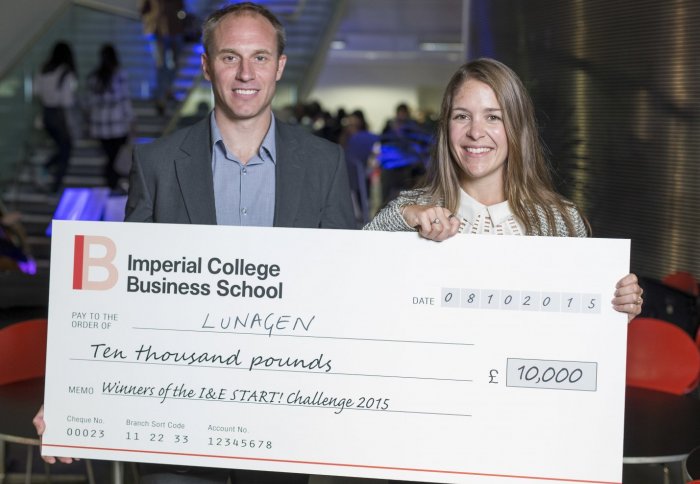

A team of students has won a Dragon's Den style competition for their idea for a device that generates electricity from slow moving water.
The team behind Lunagen, an energy hardware start-up, beat two other finalists to win £10,000 in the annual Innovation and Entrepreneurship Start! Challenge competition held last night at the Business School.
Eight shortlisted teams were given the opportunity to present their business plans to a judging panel of investors and professional venture capitalists who provide funds for business start-ups.
Lunagen, led by new MBA graduates Lauren Dickerson and Will Penfold, aims to harness energy from flowing water to generate electricity. The company’s simple and robust turbine was conceived to generate power in rivers and tidal waters with low-speed flows, while allowing fish to swim upstream and downstream. The business aims to tap into the under-exploited energy resource in developed and developing countries. Focussing on the UK, where there is a wealth of natural water resources, Lunagen aims to provide a lower cost proposition to energy suppliers and users.
The team, who has already patented their business idea, hope to benefit from generous support from the British government, which has committed significant financial resources to ensure the sustainable development of Britain’s hydro and tidal resources.
Delivering the team’s winning pitch to a panel of judges, in front of an audience of staff and students from the Business School, Lauren Dickerson stressed the economic and environmental benefits of Lungen’s business model. Appealing to the judges she said: “It’s time for us to all play our part in developing sustainable systems for the future.”
“I was impressed by the breadth of ideas and the amount of research that had gone into each business concept to establish real needs they could address. All the teams had established a target market and many had already determined a funding plan, demonstrating their serious approach to launching these projects.”
– Colin Spiller
Manager, Angels Den
Commenting on the team’s win, Lauren Dickerson said: “We are absolutely thrilled to win this competition. We’ve worked tirelessly over the past two years to develop Lunagen and look forward to the next stage of our journey in transforming this project from a business concept to a working product. The prize money will help us continue our research and development work and give us more time to raise our profile and attract our next round of funding.”
Will Penfold said: “This was a really tough competition and we never expected to beat the rival teams, who all delivered impressive pitches.
“This competition has a reputation for producing winners who have previously studied at the Royal College of Art. As a design engineer graduate from the RCA, I’m proud to continue this tradition and hope that other students will take inspiration from our achievement.”
Lunagen beat two other rival teams in the final of the competition. The runner-up was PropertyScape, a service that aims to speed up the home buying processs, by allowing prospective buyers to narrow down their choices by viewing properties in a virtual reality environment before seeing them in person. The other shortlisted team was Keepit, a service that aims to bring together charities with donors in a fast and efficient way.

Commenting on Lunagen’s win, competition judge Colin Spiller, Manager from Angels Den said: “The quality and delivery of Lunagen’s pitch was fabulous. There is a huge market for this type of product and if it works, I anticipate there will be massive takeup, with the potential to solve the UK’s greenhouse emission issues.
“The team also has a working prototype and has already filed their own patent, which shows they are serious about taking this product to market.”
Reflecting on the calibre of the shortlisted teams he added: “I was impressed by the breadth of ideas and the amount of research that had gone into each business concept to establish real needs they could address. All the teams had established a target market and many had already determined a funding plan, demonstrating their serious approach to launching these projects.”
Article text (excluding photos or graphics) available under an Attribution-NonCommercial-ShareAlike Creative Commons license.
Photos and graphics subject to third party copyright used with permission or © Imperial College London.
Reporter
Laura Singleton
Communications Division




Leave a comment
Your comment may be published, displaying your name as you provide it, unless you request otherwise. Your contact details will never be published.